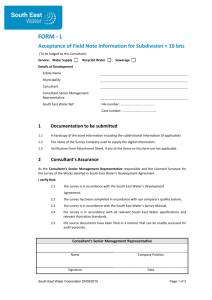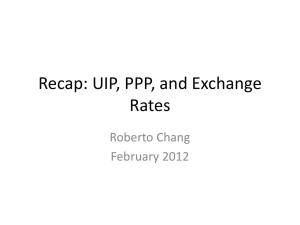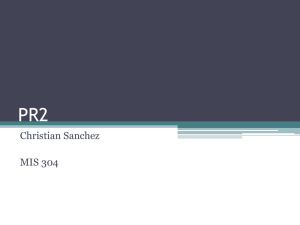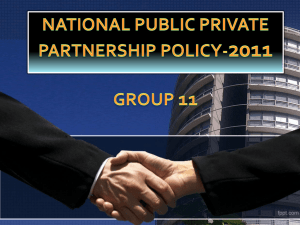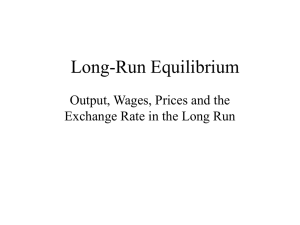Sample Terms of Reference - Public Private Partnerships in
advertisement
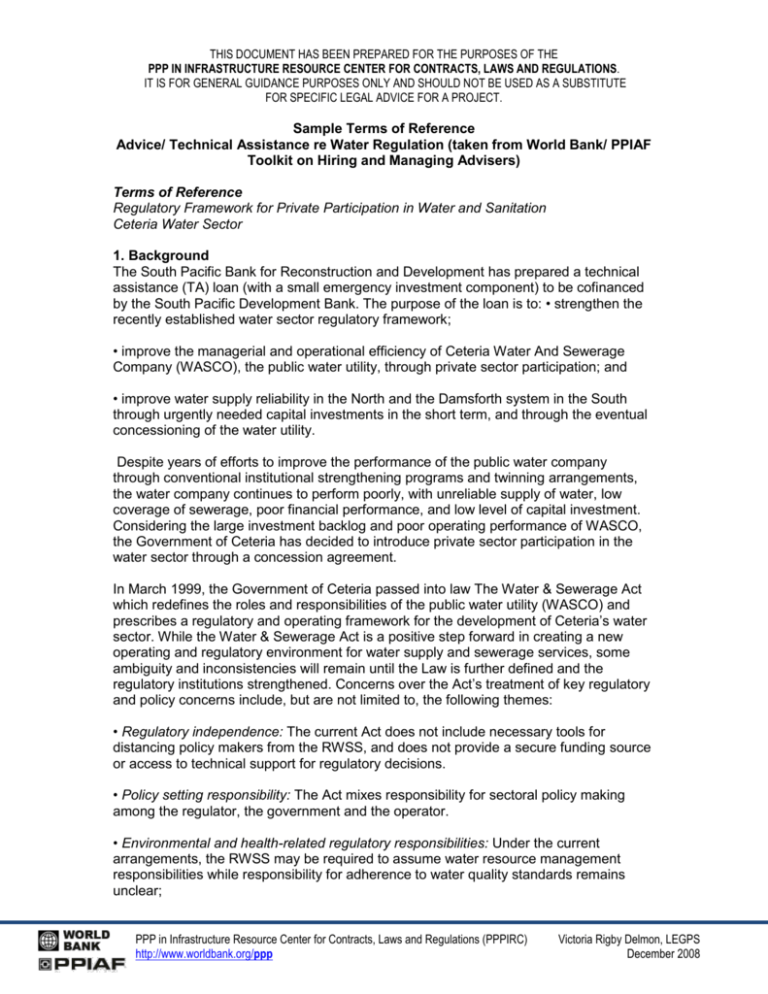
THIS DOCUMENT HAS BEEN PREPARED FOR THE PURPOSES OF THE PPP IN INFRASTRUCTURE RESOURCE CENTER FOR CONTRACTS, LAWS AND REGULATIONS. IT IS FOR GENERAL GUIDANCE PURPOSES ONLY AND SHOULD NOT BE USED AS A SUBSTITUTE FOR SPECIFIC LEGAL ADVICE FOR A PROJECT. Sample Terms of Reference Advice/ Technical Assistance re Water Regulation (taken from World Bank/ PPIAF Toolkit on Hiring and Managing Advisers) Terms of Reference Regulatory Framework for Private Participation in Water and Sanitation Ceteria Water Sector 1. Background The South Pacific Bank for Reconstruction and Development has prepared a technical assistance (TA) loan (with a small emergency investment component) to be cofinanced by the South Pacific Development Bank. The purpose of the loan is to: • strengthen the recently established water sector regulatory framework; • improve the managerial and operational efficiency of Ceteria Water And Sewerage Company (WASCO), the public water utility, through private sector participation; and • improve water supply reliability in the North and the Damsforth system in the South through urgently needed capital investments in the short term, and through the eventual concessioning of the water utility. Despite years of efforts to improve the performance of the public water company through conventional institutional strengthening programs and twinning arrangements, the water company continues to perform poorly, with unreliable supply of water, low coverage of sewerage, poor financial performance, and low level of capital investment. Considering the large investment backlog and poor operating performance of WASCO, the Government of Ceteria has decided to introduce private sector participation in the water sector through a concession agreement. In March 1999, the Government of Ceteria passed into law The Water & Sewerage Act which redefines the roles and responsibilities of the public water utility (WASCO) and prescribes a regulatory and operating framework for the development of Ceteria’s water sector. While the Water & Sewerage Act is a positive step forward in creating a new operating and regulatory environment for water supply and sewerage services, some ambiguity and inconsistencies will remain until the Law is further defined and the regulatory institutions strengthened. Concerns over the Act’s treatment of key regulatory and policy concerns include, but are not limited to, the following themes: • Regulatory independence: The current Act does not include necessary tools for distancing policy makers from the RWSS, and does not provide a secure funding source or access to technical support for regulatory decisions. • Policy setting responsibility: The Act mixes responsibility for sectoral policy making among the regulator, the government and the operator. • Environmental and health-related regulatory responsibilities: Under the current arrangements, the RWSS may be required to assume water resource management responsibilities while responsibility for adherence to water quality standards remains unclear; PPP in Infrastructure Resource Center for Contracts, Laws and Regulations (PPPIRC) http://www.worldbank.org/ppp Victoria Rigby Delmon, LEGPS December 2008 THIS DOCUMENT HAS BEEN PREPARED FOR THE PURPOSES OF THE PPP IN INFRASTRUCTURE RESOURCE CENTER FOR CONTRACTS, LAWS AND REGULATIONS. IT IS FOR GENERAL GUIDANCE PURPOSES ONLY AND SHOULD NOT BE USED AS A SUBSTITUTE FOR SPECIFIC LEGAL ADVICE FOR A PROJECT. Terms of Reference - Advice/ Technical Assistance re Water Regulation • Concessioning arrangement: The Act does not define the future role of WASCO, its relationship to the private operator, the governmental signatory of a concession agreement or the principles of private sector provision; and • Licensing regime: The Act does not provide a clear process for the provision of licenses for water sector operators. 2. Objective The Objective of the consultant’s services is to strengthen Ceteria’s regulatory framework in order to facilitate significant and sustainable private sector participation in the water and sewerage sector while protecting the interests of Ceteria’s consumers. This objective will be achieved through implementation of the following tasks: (a) A review of all relevant laws, statutes, regulations, and licenses related to the respective roles and responsibilities of the Government of Ceteria, the Regulator of Water & Sewerage Services(RWSS) and the Water and Sewerage Company (WASCO),in the interim period before the concession as well as for the period of private sector operation.; (b) The design of institutional structures and arrangements that clarify the appropriate roles, responsibilities, staffing needs, funding sources, and legal, statutory, or licensing requirements of the regulator (RWSS), a secretariat (or advisory council) to support the regulator, and the current and future water operator. (c) Presentation to the Government of Ceteria describing the legislative and/or administrative measures needed to formalize the regulatory institutions and arrangements that will provide a secure investment environment for the future operator and a fair system of protection for all consumers. This would include recommendations on the need to repeal, amend, expand, clarify and/or modify current primary and enabling legislation, regulations, statutes and licenses; (d) Drafting of all laws, regulations, statutes or licenses required to legitimize the appropriate regulatory institutions and arrangements; (e) Design of a training program for regulators and secretariat staff that will allow them to fulfill their responsibilities once the concessionaire is in place. 3. Scope Of Work 3.1 Review Of Current Regulatory Framework The consultants will conduct a thorough review of all relevant laws, regulations, statutes and licenses pertaining to regulation, policy making, operations and private sector participation through the concessioning of WASCO. The review will be carried out in consultation with the legal representative from the Attorney General’s Office and the Project Management Unit. The areas that require particular attention include, but are not limited to, the following: Page 2 of 9 PPP in Infrastructure Resource Center for Contracts, Laws and Regulations (PPPIRC) http://www.worldbank.org/ppp Victoria Rigby Delmon, LEGPS December 2008 THIS DOCUMENT HAS BEEN PREPARED FOR THE PURPOSES OF THE PPP IN INFRASTRUCTURE RESOURCE CENTER FOR CONTRACTS, LAWS AND REGULATIONS. IT IS FOR GENERAL GUIDANCE PURPOSES ONLY AND SHOULD NOT BE USED AS A SUBSTITUTE FOR SPECIFIC LEGAL ADVICE FOR A PROJECT. Terms of Reference - Advice/ Technical Assistance re Water Regulation 3.1.1 Institutional Roles and Responsibilities: Regulator of Water & Sewerage Services (RWSS), the current operating company (WASCO), future operating company/companies, and any relevant government ministries. Issues of particular concern include: • Regulatory independence: The consultant will review the legal conditions under which the RWSS commissioners are selected, appointed, removed from office, provided with funding and given access to technical support. • Responsibility for sector-wide policy making: While the Water Act establishes the RWSS as a regulator, it also seems to grant the RWSS an unusual authority to set sector-wide policies1. The consultant should review the allocation of policysetting authorities among the RWSS, Ministry, and other relevant government bodies according to the Water and Sewerage Act and other relative legislation in Ceteria. • Responsibility for introducing private sector: The Water Act may be interpreted as granting the RWSS decision-making authority regarding the introduction of private sector participation in water supply and sewerage services2. The Consultant should clarify the RWSS's role in initiating private sector participation. The Consultant should also clarify if a separate license from the RWSS is required for WASCO’s sub-licensees or for the new operator. • Responsibility for formulation of tariff formula, level and structure: The Consultant should clarify the respective roles of the RWSS, the government and the operator in defining the nation’s tariff level, formula and structure 3. • Service obligation: The Consultant should clarify the specific service obligations of WASCO4 as well as the obligations of the future operator; • Water resource management and conservation: The Consultant should clarify the allocation of roles and responsibilities for allocating and regulating water resources and setting conservation standards including the government, the regulator and the operating company’s responsibility in conserving, redistributing or otherwise augmenting water resources5; • Quality of service: The consultant should clarify the current allocation of responsibilities for setting water quality standards, and for monitoring, reporting and enforcing those standards. 1 See Articles 3 and 4. 2 See Articles 6 and 35. 3 See Articles 4 (b) and 32. 4 See Article 13. 5 See Article 9 (1)(2) Page 3 of 9 PPP in Infrastructure Resource Center for Contracts, Laws and Regulations (PPPIRC) http://www.worldbank.org/ppp Victoria Rigby Delmon, LEGPS December 2008 THIS DOCUMENT HAS BEEN PREPARED FOR THE PURPOSES OF THE PPP IN INFRASTRUCTURE RESOURCE CENTER FOR CONTRACTS, LAWS AND REGULATIONS. IT IS FOR GENERAL GUIDANCE PURPOSES ONLY AND SHOULD NOT BE USED AS A SUBSTITUTE FOR SPECIFIC LEGAL ADVICE FOR A PROJECT. Terms of Reference - Advice/ Technical Assistance re Water Regulation 3.1.2 Identification of Obstacles for PSP: The Consultant will review Ceteria’s relevant laws and statutes (including the Public Utilities Act, the Water and Sewerage Act of 1999, and any relevant corporation, investment, property or tax laws or statutes) and identify any provisions or gaps that may present obstacles to the successful concessioning of WASCO. 3.1.3 Review of Interim License for the Operations of WASCO: The Consultant will review the interim license for WASCO’s operations to determine any flaws or gaps which could be remedied quickly and to identify any obstacles the interim license may create for the future concessioning program. 3.2 Institutional Design of the Regulator and Definition of Roles and Responsibilities 3.2.2 Definition of the Regulatory Roles and Responsibilities: The Consultant will define essential roles and responsibility of the regulatory bodies necessary for successful oversight of the water sector. The Consultant should recommend the RWSS’s responsibilities with regard to: • Determining and monitoring the operator’s tariff setting procedure; • Setting, advising or responding to policy makers on appropriate performance criteria including service coverage, quality standards, environmental standards and customer relations; • Collecting information and monitoring the operator’s performance; • Imposing sanctions for non-performance; • Arbitrating disputes that may arise between the operator and its customers; • Allocating water resources: The Consultant should recommend amendments to current practice where the RWSS issues water use licenses for those abstracting water within control areas while no licenses are required for abstraction of water outside of controlled area. 3.2.3 Design of the Regulator’s Organizational Structure: The Consultant will define the organizational structure of the RWSS and related bodies to ensure its independence and accountability in performing the responsibilities determined in the task above. The Consultant should make specific recommendations on: • Appropriate use of a secretariat or advisory body to provide commissioners with support in all technical matters; • Funding sources, i.e., the options for funding the work of RWSS through license fee paid operator and/or direct levies on customers. This should include estimates for the budget requirements of the RWSS and its secretariat; • Appointment criteria based on professional expertise and absence of conflict of interest; • Job descriptions for each member of the Regulator and its Secretariat; Page 4 of 9 PPP in Infrastructure Resource Center for Contracts, Laws and Regulations (PPPIRC) http://www.worldbank.org/ppp Victoria Rigby Delmon, LEGPS December 2008 THIS DOCUMENT HAS BEEN PREPARED FOR THE PURPOSES OF THE PPP IN INFRASTRUCTURE RESOURCE CENTER FOR CONTRACTS, LAWS AND REGULATIONS. IT IS FOR GENERAL GUIDANCE PURPOSES ONLY AND SHOULD NOT BE USED AS A SUBSTITUTE FOR SPECIFIC LEGAL ADVICE FOR A PROJECT. Terms of Reference - Advice/ Technical Assistance re Water Regulation • Composition of the Regulator and its Secretariat; • Fixed and staggered tenures and transparent rules on the removal of regulators; • Competitive salaries for Secretariat; • Transparent and timely decision making processes; • Consultation procedures such as public hearings with relevant stakeholders; • Dispute resolution mechanisms; • Independent audits of the RWSS’s annual activities. The institutional design should be inclusive of the potential for eventually transferring some degree of regulatory responsibility—particularly that assigned to the Secretariat— to a regional regulatory body. The analysis for the potential of regional regulation should include the need for power regulation, and the potential for multisectoral regulation at the regional level. 3.3 Recommendations To Improve Current Legal And Regulatory Framework 3.3.1 Identifying the Mechanisms for Regulatory Strengthening: The consultant will provide recommendations that define i) need for changes to primary legislation; ii) the extent that decrees, statutes or implementing rules and regulations can be used to fill the gaps in the current regulatory structure; and iii) the extent to which clarifications to the framework can be placed inside of licenses, concessions and other contractual tools. In establishing such principles, the Consultant should confer with the legal representative from the Attorney General's Office and consider the current capacity within the relevant ministries and the RWSS to interpret broad principles. 3.3.2 Presentation to Government on Recommended Changes: Once the review and the institutional design work have been completed, the consultants should present the full recommendations to changes in the regulatory structure to the Government. In order to make perfectly clear the degree to which different tools can be used to correct the regulatory framework, presentation should include summarizing matrices such as the one below: Organization and Responsibilities of Current WASCO Organization and Responsibilities of Future WASCO Organization and Responsibilities of RWSS Organization Organization and Responsibilities of Government Agencies Other Institutions New primary legislation Legislative amendments Regulations Licenses Other Mechanisms Page 5 of 9 PPP in Infrastructure Resource Center for Contracts, Laws and Regulations (PPPIRC) http://www.worldbank.org/ppp Victoria Rigby Delmon, LEGPS December 2008 THIS DOCUMENT HAS BEEN PREPARED FOR THE PURPOSES OF THE PPP IN INFRASTRUCTURE RESOURCE CENTER FOR CONTRACTS, LAWS AND REGULATIONS. IT IS FOR GENERAL GUIDANCE PURPOSES ONLY AND SHOULD NOT BE USED AS A SUBSTITUTE FOR SPECIFIC LEGAL ADVICE FOR A PROJECT. Terms of Reference - Advice/ Technical Assistance re Water Regulation The presentation must include an analysis of how the recommended regulatory structure could be transferred to a regional body with particular attention to the need for minimizing further legal or statutory changes. 3.4 Drafting of Changes to Regulatory Framework 3.3.3 Once the government has agreed on the approach recommended in the Consultant’s Presentation, the Consultant will begin drafting all necessary documents, beginning with primary legislation (if required), including: • Draft necessary amendments to the Water and Sewerage Act of 1999 as well as any other primary legislation; • Draft necessary implementing rules and regulations to define the roles and responsibilities of the regulator, the operator and other relevant agencies; and • Outline the main articles of the new operating license and concession agreement for the future concessionaire. 3.5 Training Needs Assessment 3.5.1 Assessment of Skill Requirement and Recommendation on Training Options: The Consultant will determine the skills required to meet the outputs necessary for the regulatory agency; assess what training is required to develop those skills; and provide a series of options for delivering the training. Since staff are not yet in place for the agency, it is impossible to know exactly what training each staff member will require. Consequently, the consultant should develop a framework that will allow the agency staff to assess their existing skills against the agency's needs and then consider the options for meeting any skills gap. Options for delivering the training should include international courses, regional and local training plus tailored in-house courses and on-the-job training. Any option should be assessed in terms of the cost-benefit trade-off provided so that agency staff can make appropriate decisions about the most cost-effective way of meeting the skills gap. 3.6 Workshops in Ceteria 3.6.2 Workshop for Government and Commissioners: The Consultant will prepare and present findings on the recommended regulatory structure and the nature of independent and accountable regulation and discuss the training requirements and options with the members of the RWSS and other relevant government officials of Ceteria. 4 Outputs The Technical Assistance program described above will result in the following outputs: 4.1 Inception Report on the Current Roles and Responsibilities in Ceteria’s Water Sector. 4.2 Institutional Design Recommendations 4.3 Presentation to Government on Recommended Changes to Regulatory Framework 4.4 Draft Changes to the Regulatory Framework: - Draft Amendments to the Water and Sewerage Act of 1999 and any other primary legislation; - Draft Implementing Rules and Regulations required to establish the recommended regulatory framework; - Outline of License and Concession Agreements Page 6 of 9 PPP in Infrastructure Resource Center for Contracts, Laws and Regulations (PPPIRC) http://www.worldbank.org/ppp Victoria Rigby Delmon, LEGPS December 2008 THIS DOCUMENT HAS BEEN PREPARED FOR THE PURPOSES OF THE PPP IN INFRASTRUCTURE RESOURCE CENTER FOR CONTRACTS, LAWS AND REGULATIONS. IT IS FOR GENERAL GUIDANCE PURPOSES ONLY AND SHOULD NOT BE USED AS A SUBSTITUTE FOR SPECIFIC LEGAL ADVICE FOR A PROJECT. Terms of Reference - Advice/ Technical Assistance re Water Regulation 4.5 Report on Training Needs and Options for Regulatory Skill Development: This report will consist of the following: - Analysis on the skill requirements and training need for the RWSS and its Secretariat; and - Suggestion on appropriate training options for these bodies. 4.4 Workshops in Ceteria: The Consultant will hold a workshops in Ceteria for commissioners, government officials, key WASCO staff and potential Secretariat staff to present and discuss: - The role and activities of independent and accountable regulators, skill requirements for such regulation, and available training options; and - Necessary legislative and administrative changes to ensure the regulators' independence and accountability, as well as the process for transferring the regime to regional regulation. 5 Management Plan 5.1 Qualifications The assignment is for a team led by a senior utility regulation specialist supported by an international lawyer(s) expert in world standards in water laws and regulations, a local lawyer(s) familiar with workings of Ceteria's legal system and supporting regulatory analyst(s). The regulation specialist should have extensive experiences with designing infrastructure regulatory systems and be familiar with best practices for institutional arrangements for water resource management and the economic regulation of potable water supply. The international lawyer should have expertise in water-related laws. The local lawyers should be familiar with the constitution, administrative laws, and other laws of Ceteria relevant to this assignment. 5.2 Levels of Effort The consultancy is estimated to require approximately 59 person/weeks in total, including 21 person-weeks for senior and junior regulatory specialists, 16 personweeks for international lawyers, 16 person-weeks for local lawyers, and 6 personweeks for analytical support and training specialists. 5.3 Duration It is expected that the consultancy will last about 16 weeks. 6 Proposal structure and scoring criteria 6.1 Type of Contract and Budget As mentioned in the attached Data Sheet, the type of contract will be a Fixed Budget. The maximum budget allowed (including all fees, expenses, taxes and any other cost to the consultant) will be US$xxxxx. The financial proposal from the firm with the highest scoring technical proposal will be opened at a Public Opening (date to be announced). If the financial proposal has been calculated without error (rates, levels of effort, fees, expenses, per diem, taxes, etc.) and does not exceed the dollar amount above, then that firm will be invited to enter into negotiations with the Government of Ceteria to carryout the consultancy. 6.2 Technical Proposal The Technical Proposal should contain: • a brief background on the proposed consulting team specifying the degree to which the firms and individuals have collaborated on past assignments; Page 7 of 9 PPP in Infrastructure Resource Center for Contracts, Laws and Regulations (PPPIRC) http://www.worldbank.org/ppp Victoria Rigby Delmon, LEGPS December 2008 THIS DOCUMENT HAS BEEN PREPARED FOR THE PURPOSES OF THE PPP IN INFRASTRUCTURE RESOURCE CENTER FOR CONTRACTS, LAWS AND REGULATIONS. IT IS FOR GENERAL GUIDANCE PURPOSES ONLY AND SHOULD NOT BE USED AS A SUBSTITUTE FOR SPECIFIC LEGAL ADVICE FOR A PROJECT. Terms of Reference - Advice/ Technical Assistance re Water Regulation • a proposed approach or work plan that elaborates and/or improves upon the approach and outline provided in these ToR; • a management plan that relates the team members to the tasks to be performed and describes each team member’s planned contribution to the analysis in person/days in Ceteria and at home and according to task; • firm qualifications of each corporate member of the consortium; • full cv’s of each individual consultant who is proposed; • Gantt or bar charts detailing the duration of each task and the involvement of individuals over time. 6.3 Financial Proposal The Financial Proposal should contain: • Fee breakdown: Daily rates and numbers of days, by task, of each member of the consulting team • Expenses: All meals, hotel, travel, incidentals, communication, production, facilities and other expenses anticipated for the project; • Calculation of total cost. 6.4 Threshold for opening of Technical bid Technical Threshold to Reach Opening of Financial Proposal: 80 points 6.5 Proposal evaluation [assuming that procurement processes of authority allow for this] The technical proposal will be scored as follows. • Proposed Approach (value added of work plan, originality)15 points (15%) • Proposed Management Plan (levels of effort, use of key staff, field time, previous experiences working as a team, appropriateness of assignments) 10 points (10%) • Firm Experience 25 points (25%) of which: - Utility/water regulation, legal development 15 points (15%) - Small scale systems regulation 5 points (5%) - South Pacific experiences 5 points (5%) • Curriculum Vitae Of Proposed Staff 50 points (50%) of which: - Regulatory specialist 20 points (20%) - International lawyer 20 points (20%) - Local lawyer 10 points (10%) Consultants will be judged according to their knowledge and expertise in development of a regulatory framework for private participation in water sector; in drafting legislation and administrative orders; in institutional arrangements for water resource management and water supply; in sectoral and regional regulation; and in training needs assessment. As a whole, the team will also be judged according to its combined experience and complementary skills in conducting thorough analysis such as that described in these Terms of Reference. This will allow one team member's functional skills or regional experience in the South Pacific, for example, to compensate for other team members who may offer different skills. Page 8 of 9 PPP in Infrastructure Resource Center for Contracts, Laws and Regulations (PPPIRC) http://www.worldbank.org/ppp Victoria Rigby Delmon, LEGPS December 2008 THIS DOCUMENT HAS BEEN PREPARED FOR THE PURPOSES OF THE PPP IN INFRASTRUCTURE RESOURCE CENTER FOR CONTRACTS, LAWS AND REGULATIONS. IT IS FOR GENERAL GUIDANCE PURPOSES ONLY AND SHOULD NOT BE USED AS A SUBSTITUTE FOR SPECIFIC LEGAL ADVICE FOR A PROJECT. Terms of Reference - Advice/ Technical Assistance re Water Regulation Consultants are asked to provide references for all past projects listed on curriculum vitae and in the statement of firm qualifications. All firm qualifications should be seven years old or less. 6.6 Submission information The original and 3 copies of the technical proposal as well as the original and 3 copies of the financial proposal should be sent in separate envelopes to the following address: Ministry of Finance and Planning Office of State Reform 12 Dryer Lane North Island Republic of Ceteria Attention: Water regulatory proposal Proposals must arrive at the Office of State Reform no later than 1500 hours on 1 December 2001. Page 9 of 9 PPP in Infrastructure Resource Center for Contracts, Laws and Regulations (PPPIRC) http://www.worldbank.org/ppp Victoria Rigby Delmon, LEGPS December 2008
